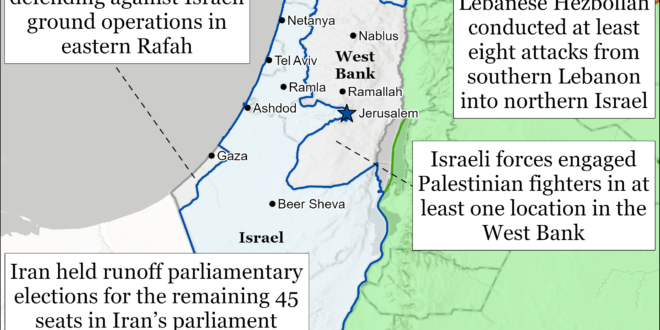Palestinian militias conducted at least 17 attacks targeting the Israel Defense Forces (IDF) in Zaytoun on May 10, suggesting that Hamas was able either to preserve or reconstitute military capability in Zaytoun despite IDF operations there.[i] The IDF launched a re-clearing operation into Zaytoun neighborhood, southern Gaza City, on May 8, marking the third time that the IDF has conducted a clearing operation there.[ii] Hamas infiltrated and began reconstituting itself in the northern Strip after the IDF withdrew from the area in December 2023.[iii] Hamas fighters used snipers, rocket-propelled grenades, and mortars in five of the 17 attacks in the Zaytoun area.[iv] This high rate of attacks is not consistent with a destroyed military force. A destroyed military force temporarily or permanently loses the will or means to fight.[v] Palestinian militias retain the will and the means to continue disrupting and defending against IDF raids, as evidenced by the rate of Palestinian militia attacks during this raid.
The resilience of Hamas and other Palestinian militia groups in Zaytoun is a strong indicator that an IDF operation in Rafah will not destroy Hamas. Hamas has survived as a military entity in the remainder of the Strip, including throughout the north. Hamas is active outside of Zaytoun in areas the IDF has not attempted to re-clear.[vi] The group has conducted attacks targeting Israeli forces east of Jabalia, six kilometers north of Zaytoun.[vii] These attacks indicate that Hamas cells have a rear area from which they can mount attacks on IDF units operating along the Gaza Strip-Israel border. These safe areas are probably in Jabalia or northern Shujaiya.[viii] The IDF has not conducted operations in either of these areas since it began drawing down its forces in the Gaza Strip.
Iranian hardliners are continuing to discuss Iran’s ability to procure a nuclear weapon. A hardline Iranian parliamentarian speculated that Iran had developed nuclear weapons in an interview on May 10.[ix] Newly-elected Parliamentarian Ahmad Bakhshayesh Ardestani told the moderate-aligned Rouydad 24 outlet that Iran had obtained nuclear weapons but had not and would not announce that it had nuclear weapons. Ardestani’s comments were speculative in nature, and he is likely unable to such information in his current role. Ardestani’s comments follow Strategic Foreign Relations Council Chairman Kamal Kharrazi‘s comment in an al Jazeera interview on May 9 that Iran will have “no choice” but to change its nuclear doctrine if Israel threatens Iran’s existence.[x] These statements align with International Atomic Energy Agency Chief Rafael Grossi’s May 8 comments that the agency was working ”very hard with [Iran] to prevent [nuclear weaponization] from happening,” suggesting that Iran has already obtained or is close to obtaining the ability to procure nuclear weapons.[xi]
These discussions coincide with an April 2024 report that claimed that Iran is attempting to obtain 300 tons of uranium yellowcake from Niger.[xii] A French investigative outlet reported on April 30 that Iran and Niger have been negotiating a deal since late 2023 for Iran to provide military drones and surface-to-air missiles in exchange for 300 tons of uranium yellowcake. This quantity is significant given that Iran announced in 2019 that it intended to produce 300 tons of yellowcake per year by 2024. A Nigerien delegation notably traveled to Tehran in January 2024 and signed unspecified agreements with Iranian officials, including Defense and Armed Forces Logistics Minister Brig. Gen. Mohammad Reza Gharaei Ashtiani. Ashtiani is responsible for managing the Iranian defense industry, including arms procurement and sales. Niger ended its counterterrorism partnership with the United States in March 2024 after US officials accused Niger of secretly exploring a deal to allow Iran access to Nigerien uranium reserves. Iranian Foreign Affairs Minister Hossein Amir Abdollahian met with the new Iranian ambassador to Niger the same day that Niger suspended its counterterrorism cooperation with the United States.
Iranian-Zimbabwean cooperation has also increased in recent weeks amid Iranian hardliner comments about the Iranian nuclear program, as CTP previously reported.[xiii] Zimbabwe participated in the inaugural Iranian Nuclear Science and Technology Conference, for example, in Esfahan City between May 6-8.[xiv] The Times claimed in 2013 that Zimbabwe had signed an agreement with Iran to sell materials for Iran’s nuclear weapons program, which Zimbabwe has since denied.[xv] No further reporting has corroborated The Times’ 2013 report.
Key Takeaways:
- Northern Gaza Strip: The large number of Palestinian militia attacks in Zaytoun targeting Israeli forces suggests that Hamas was able either to preserve or reconstitute military capability in Zaytoun despite previous IDF operations there.
- Iran: Iranian hardliners are continuing to discuss Iran’s ability to procure a nuclear weapon.
- Rafah: The Israeli cabinet reportedly unanimously approved an expansion of the Rafah operation, but the IDF operations in Rafah remained limited on May 10.
- Iraq: The Islamic Resistance in Iraq—a coalition of Iranian-backed Iraqi militias—claimed five attacks targeting Israel since CTP-ISW’s last data cut-off on May 9.
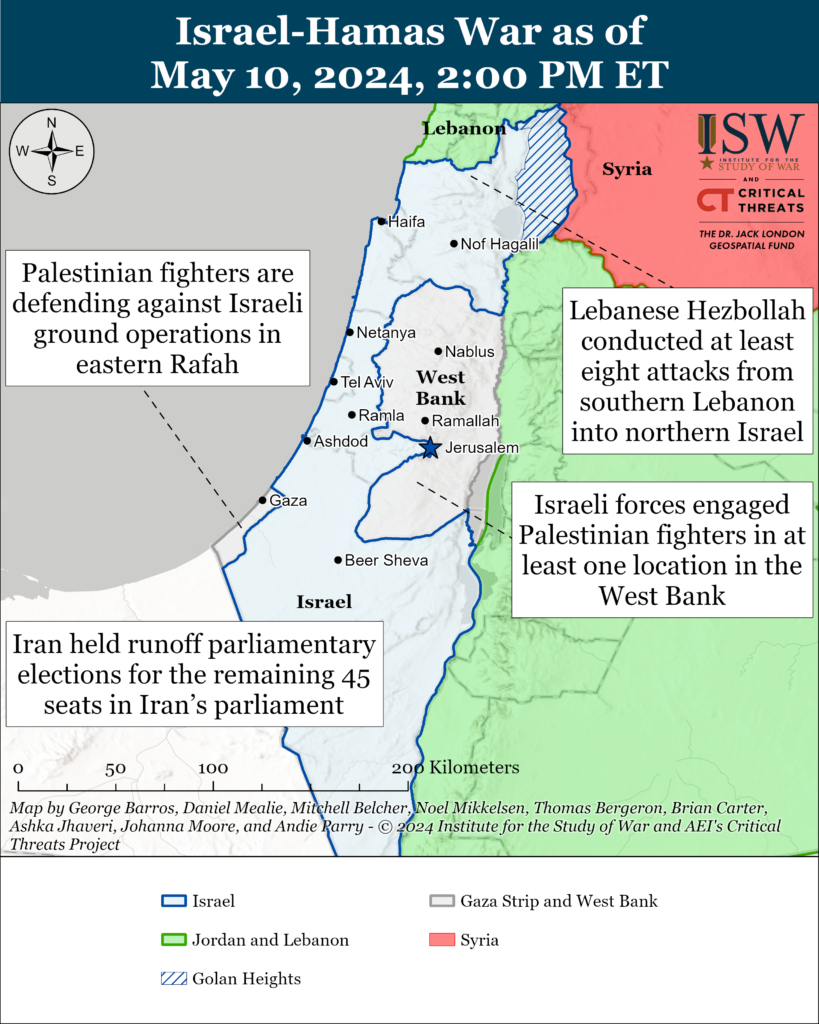
Gaza Strip
Axis of Resistance objectives:
Erode the will of the Israeli political establishment and public to sustain clearing operations in the Gaza Strip
Reestablish Hamas as the governing authority in the Gaza Strip
The IDF 2nd Reservist Infantry Brigade and Nahal Brigade continued a limited raid targeting Palestinian militias in Zaytoun on May 10.[xvi] The IDF Nahal Brigade engaged Palestinian fighters at close range and directed airstrikes targeting fighters in Zaytoun.[xvii] Israeli forces seized small arms, ammunition, and Hamas intelligence material from a school in Zaytoun.[xviii] The IDF Air Force struck a building rigged to explode and other militia sites in Zaytoun.[xix] Local Palestinian sources reported that Israeli armor operated near the Dawla Roundabout in Zaytoun.[xx] Israeli forces previously operated in these specific zones of Zaytoun in two previous operations.[xxi]
Israeli forces continued to defend against Palestinian militia attacks on Netzarim Corridor on May 10. The 679th Brigade directed an airstrike on a Palestinian militia cell departing a munitions warehouse and approaching Israeli forces in the central Strip on May 10.[xxii] The IDF Air Force also struck the munitions warehouse.[xxiii] Hamas and Popular Front for the Liberation of Palestine–General Command (PFLP-GC) fighters fired rockets targeting Israeli positions on the Netzarim Corridor.[xxiv] PFLP-GC is a Palestinian faction based primarily in Syria.[xxv] The faction receives support from Iran and has cooperated with other elements of the Axis of Resistance.[xxvi]
The Israeli cabinet unanimously approved an expansion of IDF operations in Rafah on May 9, according to Israeli media.[xxvii] Two unspecified sources with knowledge of the operational plans told Axios that the approved “measured expansion” does not cross US President Joe Biden’s “red line” for a “major military operation“ in Rafah.[xxviii] A third source disagreed and said that the approved operation could be interpreted by the US as crossing Biden’s red line.[xxix] US President Joe Biden said on May 8 that the United States will stop supplying Israel with certain weapons if Israel conducts a major military operation into Rafah.[xxx]
IDF operations in eastern Rafah remained limited on May 10. The IDF Givati Brigade (162nd Division) continued to operate in eastern Rafah to destroy militia infrastructure and clear the area.[xxxi] The IDF has killed dozens of fighters, located tunnel shafts, and seized weapons since beginning limited clearing operations in eastern Rafah on May 7.[xxxii] The IDF 401st Armored Brigade (162nd Division) also engaged several Palestinian militia cells near the Rafah crossing.[xxxiii]
Hamas defended against Israeli advances into eastern Rafah on May 10. Hamas conducted three tactically sophisticated attacks targeting Israeli forces in Rafah on May 10. One complex Hamas attack targeted Israeli forces with thermobaric bombs, rocket-propelled grenades, and anti-personnel rocket in a multi-stage attack.[xxxiv] Two other Hamas attacks targeted Israeli forces using a tunnel shaft and a pre-laid mine field near a military site in eastern Gaza, demonstrating Palestinian fighters have prepared to slow the IDF advance into Rafah.[xxxv] The sophisticated nature of these attacks required planning, coordination, and organization, further underscoring that the Hamas battalions in Rafah are cohesive fighting units that can mount a deliberate defense against Israeli clearing operations in the southern Gaza Strip.[xxxvi]
Palestinian militias, including Hamas, conducted 18 total attacks against an IDF advance into eastern Rafah on May 10.[xxxvii] The militias conducted at least eight mortar or rocket attacks targeting Israeli forces advancing through the eastern Rafah neighborhoods of al Shoka, al Salam, and al Bayuk on May 10.[xxxviii] Palestinian fighters also engaged Israeli forces eight times near a military site in the al Bayuk area along the Salah al Din Road.[xxxix]
The IDF Air Force struck over 40 targets across the Gaza Strip on May 10.[xl] IDF 143rd Division directed strikes on anti-tank munition firing positions and tunnel shafts throughout the strip.[xli]
UN officials stated on May 10 that no fuel and “virtually no” humanitarian aid has entered the Gaza Strip for five days.[xlii] The Coordinator of Government Activities in the Territories (COGAT)—a department within the Israeli Defense Ministry—said that 200,000 liters of fuel entered the Kerem Shalom crossing on May 10.[xliii] UN officials told The Washington Post that the aid trucks that the IDF had allowed to enter through the Kerem Shalom crossing were unable to move further into the Gaza Strip due to heavy fighting near the crossing.[xliv] Palestinian militias conducted at least 18 attacks targeting Israeli forces in eastern Rafah on May 10.[xlv] The IDF previously closed the Kerem Shalom crossing on May 5 after a Hamas rocket attack killed four Israeli soldiers nearby.[xlvi] The IDF reopened the Kerem Shalom crossing on May 8 to allow humanitarian aid to enter the Gaza Strip.[xlvii]
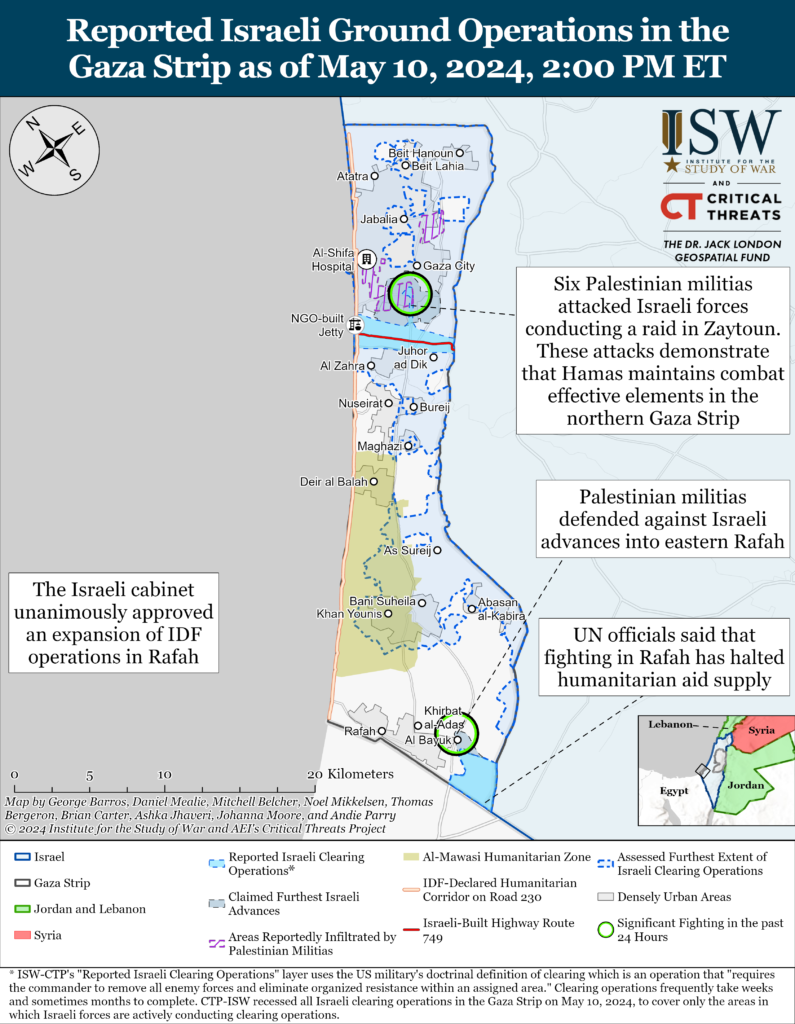
CTP-ISW recessed our Israeli clearing operations layer in the Gaza Strip on May 10, 2024, to cover only the areas in which Israeli forces are actively conducting clearing operations. Israel began drawing down its forces in the northern Gaza Strip on December 31, 2023, and all Israeli units left the Gaza Strip except one brigade in the Netzarim Corridor on April 6, 2024. There are two reservist brigades in the Netzarim Corridor as of May 10, 2024. The IDF’s 162nd Division reentered the strip in Rafah on May 7, 2024.
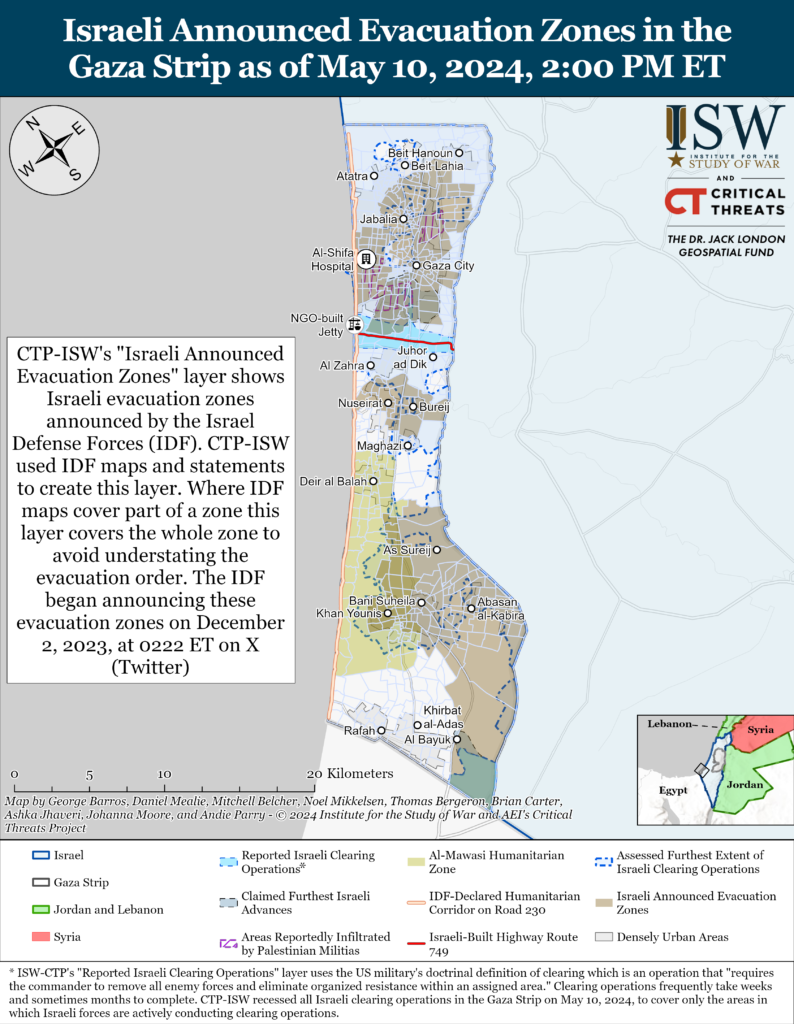
Palestinian militias conducted seven indirect fire attacks from the Gaza Strip targeting southern Israel on May 10. Hamas fighters conducted five of the seven attacks, including two separate rocket barrages on Beer Sheva and a mortar attack on a military site near Kerem Shalom.[xlviii] Israeli media reported the Hamas rocket barrages on Beer Sheva caused material damage and one injury.[xlix] Two smaller Palestinian militias allied with Hamas in the war targeted southern Israel.[l]
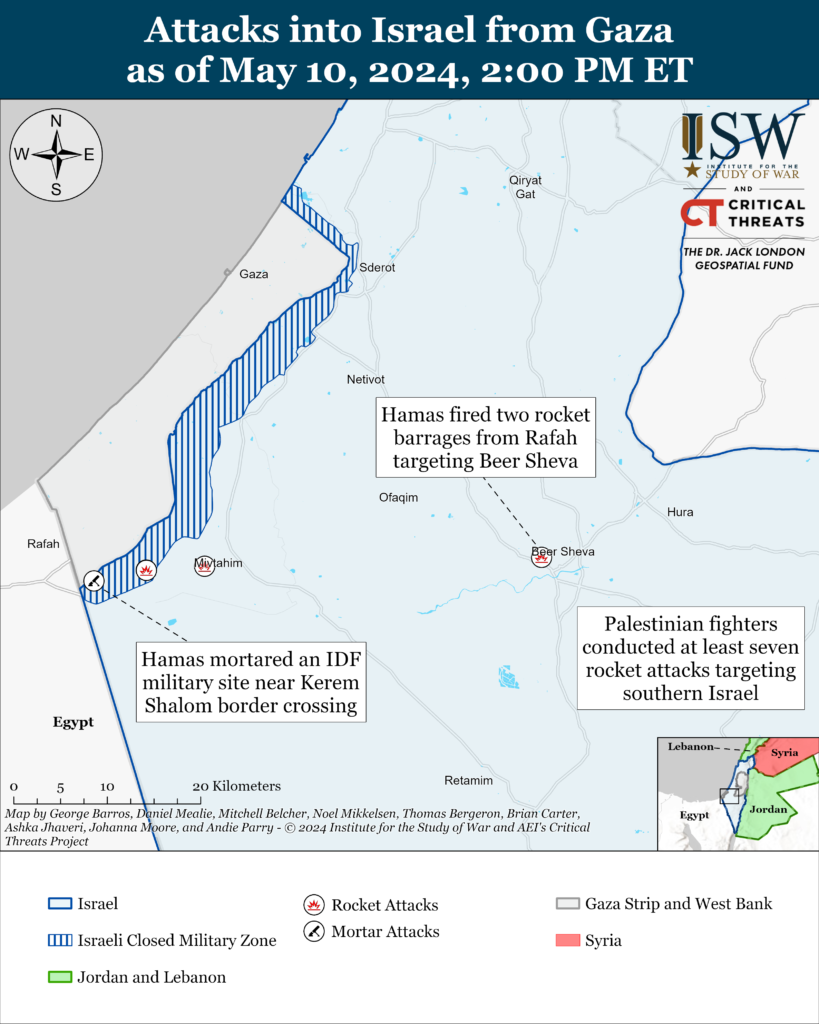
Recorded reports of attacks; CTP-ISW cannot independently verify impact.
West Bank
Axis of Resistance objectives:
Establish the West Bank as a viable front against Israel
Israeli forces have engaged Palestinian fighters in at least one location in the West Bank since CTP-ISW’s data cut off on May 9.[li] Unspecified fighters fired small arms targeting Israeli forces during Israeli operations in Rafidia, near Nablus.[lii]
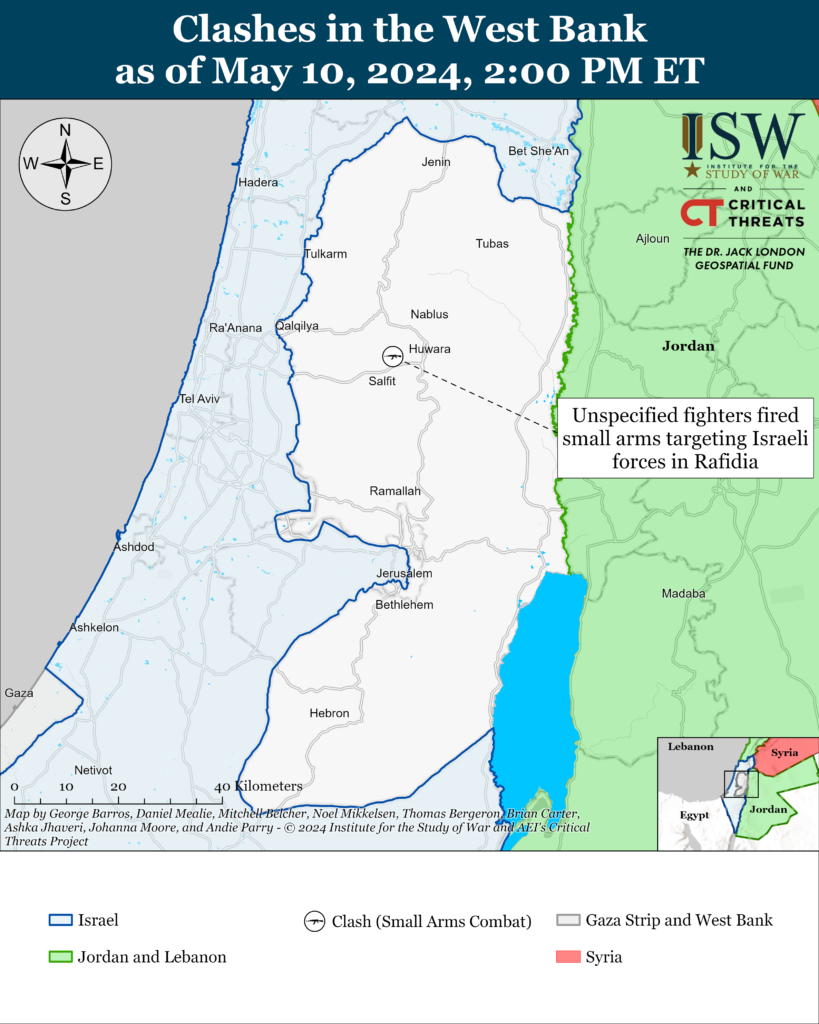
This map is not an exhaustive depiction of clashes and demonstrations in the West Bank.
Southern Lebanon and Golan Heights
Axis of Resistance objectives:
Deter Israel from conducting a ground operation into Lebanon
Prepare for an expanded and protracted conflict with Israel in the near term
Expel the United States from Syria
Lebanese Hezbollah has conducted at least eight attacks from southern Lebanon into northern Israel since CTP-ISW’s last data cutoff on May 9.[liii] This number of attacks is consistent with Hezbollah’s daily rate of attacks over the last week. Hezbollah fired at least 20 rockets targeting Kiryat Shmona on May 10. This rocket attack caused damage to buildings in the area.[liv]
The IDF Northern Command conducted several military exercises in northern Israel on May 10 to simulate combat in Lebanon.[lv] Units from the 91st Division and Etzion Brigade (36th Division) participated in the exercises, which included practicing coordination in mountainous terrain and resupplying ”maneuvering forces” by air.[lvi] The IDF said that the exercises are meant to improve readiness for a potential conflict in northern Israel.
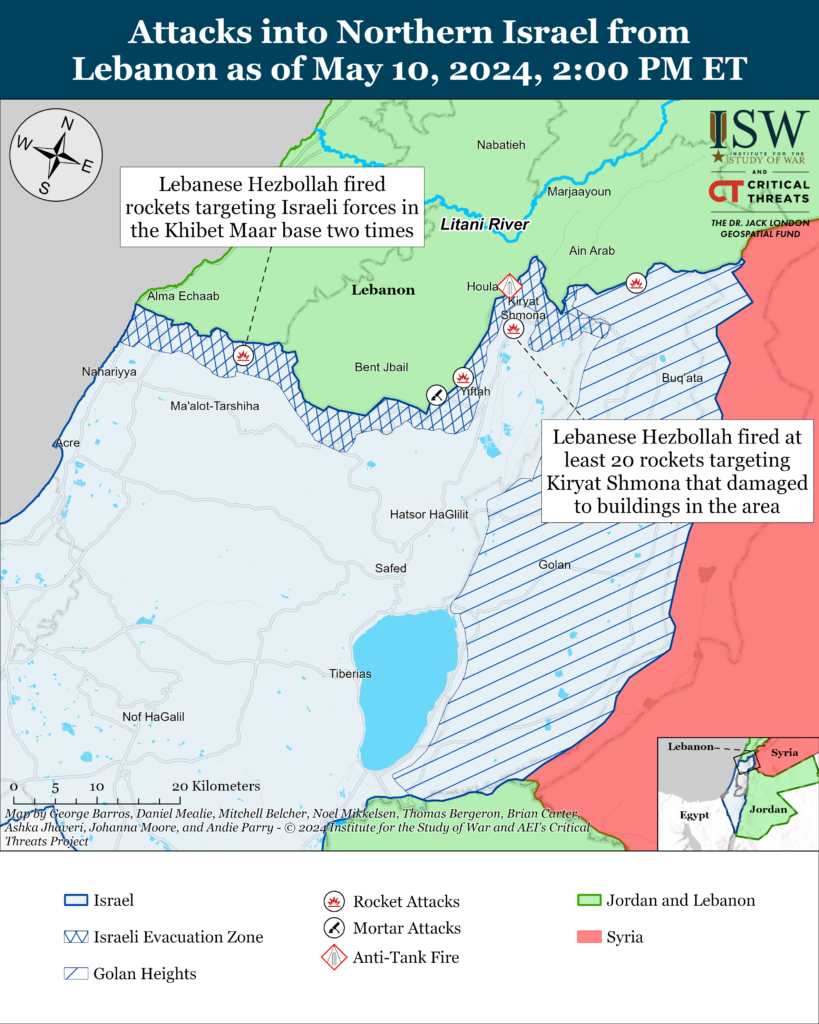
Recorded reports of attacks; CTP-ISW cannot independently verify impact.
Iran and Axis of Resistance
The Islamic Resistance in Iraq—a coalition of Iranian-backed Iraqi militias—claimed five attacks targeting Israel since CTP-ISW’s last data cut-off on May 9.[lvii] The Islamic Resistance in Iraq claimed three drone attacks targeting the “Elifalet” base near Safed in northern Israel, an Israeli gas platform in the Mediterranean Sea, and Ovda Airbase in Eilat, Israel.[lviii] The Islamic Resistance in Iraq also claimed two drone attacks targeting a separate IDF base and an unspecified “vital target” in Eilat, Israel.[lix] CTP-ISW cannot verify that any claimed attacks occurred.
Iran held runoff parliamentary elections for the remaining 45 seats in Iran’s parliament on April 10.[lx] The first round of Iranian parliamentary elections on March 1 resulted in hardliners winning 200 out of 245 seats.[lxi] The March 1 election had record-low voter turnout of 41% in Iran.[lxii] The runoff election will elect the remaining 45 representatives, including 16 representatives for Tehran province, from a pool of 90 total candidates.[lxiii] Fifteen of the 90 regime-approved candidates are moderates. The results of the runoff election will likely be announced by May 13.[lxiv] The runoff elections will most likely preserve hardliner control of the parliament and maintain hardliner influence within the Iranian leadership. CTP-ISW previously assessed that the Iranian regime is continuing to engineer national elections to consolidate hardline influence in the political establishment.[lxv]
 Eurasia Press & News
Eurasia Press & News
